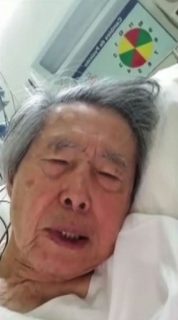
LIMA, Peru (AFP) — Peru’s ex-president Alberto Fujimori said from his hospital bed Thursday that a return to prison would be a “death sentence,” the day after a court revoked a pardon for crimes against humanity.
Fujimori, 80, addressed a plea to Peru’s President Martin Vizcarra and the South American country’s judiciary in a video recorded at his bedside.
“Please do not kill me. If I return to prison my heart will not support it. It is too weak to go through the same thing again. Don’t sentence me to death. I can give no more.”
A court on Wednesday annulled a presidential pardon for Fujimori, ending more than nine months of freedom granted under the shock pardon issued by a previous president in December.
However, immediately after his re-arrest Fujimori was admitted to a clinic with heart problems.
His doctor, Alejandro Aguinaga, told reporters he experienced a drop in blood pressure and an accelerated heart beat — the same problems for which he has been hospitalized in the past.
“He is already considered a prisoner,” Interior Minister Mauro Medina told Chile’s RPP radio.
“He is expected to leave the clinic to take him to the penitentiary,” the minister said.
Fujimori, a Peruvian of Japanese descent, has been living in Lima but has been hospitalized four times since his release last December.
His daughter Keiko Fujimori, leader of the main opposition Popular Force party, described the court’s decision on Wednesday as “inhuman” and “unjust”.
“Today is the saddest day of our lives. It’s painful,” said Keiko, who is seen by many Peruvians as the heir to Fujimori’s political dynasty.
Questionable pardon
Fujimori was pardoned last December on humanitarian grounds, but critics said the move was in exchange for Fujimori’s son helping then-president Pedro Pablo Kuczynski avoid impeachment.
Fujimori was 12 years into a 25-year jail sentence handed down for ordering two massacres by death squads between 1991 and 1992.
He had ruled Peru with an iron fist between 1990 and 2000.
Victims of Fujimori’s crackdown had petitioned the Inter-American Court to demand a judicial review of the process that led to the pardon.
The charge of crimes against humanity stemmed in part from the killings or disappearances of scores of civilians — allegedly by a shadowy squad of military officers — during Peru’s bloody struggle against Maoist rebels.
The ex-ruler is revered and despised in equal measure in Peru. Admirers laud him for dragging the country’s economy into the modern era and defeating the Shining Path guerrilla movement.
© Agence France-Presse







